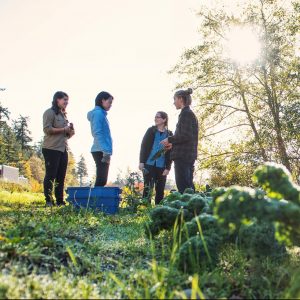Preparing UBC graduates for the food systems workplace

The Centre for Sustainable Food Systems (CSFS) launched a new wave of LFS Career Development opportunities (LFS 496) in 2016, as a way to increase student access to for-credit, mentored learning experiences with a food business or organization.
“This career development program came as a result of students telling us they wanted to get their hands dirty. They wanted practical experience in the workplace,” says Véronik Campbell, Academic Programs Manager at the CSFS at UBC Farm. Career development placements are posted on the CSFS website, allowing students to apply and interview just as they would for a regular job posting. Students earn 3-6 credits in the course, working directly with a workplace mentor over one or two semesters. Students also form a cohort engaging in professional development activities such as the Strengthfinders assessment, a food values exercise, and a session on improving workplace communication.
“The goal of this program is to prepare our graduates both professionally and academically for future careers in the food system,” says Hannah Wittman, LFS Professor and CSFS Academic Director. “Students actively apply the theory they have received in their undergraduate courses in a conscious, practical way, through on-the-ground food system-related work.”
For some career development placements, students literally get their hands dirty in the fields of the UBC Farm, working with poultry or perennial crops, while other positions focus on food system opportunities such as curriculum creation for children’s food literacy programs or engagement with BC progressive food businesses.
“Participating in a career development placement at UBC Farm showed me how food and sustainability are integral to good health which made me see the UBC Farm as a home of solutions for local challenges that will eventually lead to global changes,” said Sigbrit Søchting, Biodiversity and Perennial Crops student
Career development positions are also growing off campus, where food systems organizations can apply to mentor a student. Previous students have worked with Inner City Farms, the Richmond Food Security Society, and the Working Group on Indigenous Food Sovereignty.
“We also created the program to respond to the needs of BC food systems” adds Ms. Campbell. “We wanted to build resources and empower organizations, and to have this program become an asset for the BC food system, providing highly-qualified UBC graduates that are ready to hit the ground running.”
This article was originally published in the Land and Food System magazine Reach Out, Issue 28 Fall 2017.
Comments are closed, but trackbacks and pingbacks are open.